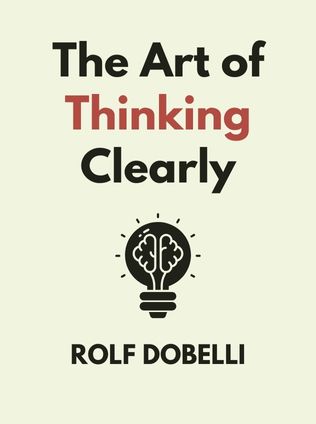
The Art of Thinking Clearly
By Rolf Dobelli
Published 01/2011
About the Author
Rolf Dobelli, a Swiss author and entrepreneur, has distinguished himself as a thought leader in the field of rational decision-making. Born in 1966, Dobelli initially pursued a career in business, earning an MBA and a doctorate from the University of St. Gallen. He went on to co-found getAbstract, a leading provider of book summaries, before shifting his focus to writing. His keen interest in understanding the common pitfalls of human thinking led to the creation of his best-selling book, The Art of Thinking Clearly. In this book, Dobelli explores the psychological biases and logical fallacies that often cloud our judgment, with the goal of helping readers make better decisions in all areas of life.
Dobelli’s work is heavily influenced by his extensive reading in the fields of psychology, philosophy, and economics. He is particularly inspired by the works of Nassim Nicholas Taleb, Daniel Kahneman, and Charlie Munger. His writing style is characterized by its clarity and practicality, making complex concepts accessible to a wide audience. Dobelli’s insights are not just theoretical; they are grounded in real-world examples and actionable advice, which is why his work has resonated with millions of readers around the globe.
Main Idea
The Art of Thinking Clearly is a compelling exploration of the cognitive biases and logical fallacies that undermine our ability to think rationally. Dobelli argues that many of our decisions are flawed because we rely on mental shortcuts, or heuristics, which often lead us astray. These biases are deeply ingrained in our thinking, the result of evolutionary adaptations that once served us well in a simpler world but are now mismatched to the complexities of modern life.
Rather than providing a prescriptive guide on how to think logically, Dobelli adopts a via negativa approach, focusing on what not to do. By becoming aware of the common traps our minds fall into, we can learn to avoid them and make more rational decisions. The book covers a wide range of biases, from confirmation bias and authority bias to hindsight bias and the sunk cost fallacy. Each chapter is devoted to a specific bias, providing clear explanations, real-world examples, and practical advice on how to counteract these mental errors.
Table of Contents
- You Want to Belong to the Group
- You Pay Attention to the Wrong Things
- You’re Using the Wrong Kind of Thinking
- You Struggle to Understand Complex Math
- Your Memory Is Not as Reliable as You Think It Is
- You Misinterpret Cause and Effect
- You Struggle to Understand Probability and Predictions
- You Value Things for Arbitrary Reasons
You Want to Belong to the Group
One of the most powerful influences on our thinking is the desire to fit in with a group. Dobelli explains that this desire is deeply rooted in our evolutionary past. In ancient times, being part of a group was crucial for survival; those who were ostracized faced a much higher risk of death. Today, while the physical dangers of being alone have diminished, the psychological need to belong remains strong. This need manifests in various biases that affect our decision-making.
Social Proof and Authority Bias
The first bias Dobelli discusses in this context is social proof. Social proof refers to the tendency to follow the actions of others when we are unsure of what to do. This can be seen in everything from fashion trends to investment choices. When we see others doing something, we assume they have good reasons for doing it, and we follow suit without critically evaluating the situation ourselves.
“Most of us would rather be wrong with the crowd than be right on our own.” — Rolf Dobelli
Sign up for FREE and get access to 1,400+ books summaries.
You May Also Like
The Subtle Art of Not Giving a F*ck
A Counterintuitive Approach to Living a Good Life
By Mark MansonRich Dad Poor Dad
What the Rich Teach Their Kids About Money - That the Poor and Middle Class Do Not!
By Robert T. KiyosakiHow To Win Friends and Influence People
The All-Time Classic Manual Of People Skills
By Dale CarnegieFreakonomics
A Rogue Economist Explores the Hidden Side of Everything
By Steven D. Levitt and Stephen J. Dubner



















